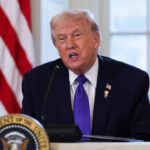Mark Carney, former governor of the Bank of Canada and the Bank of England, is set to become Canada’s next prime minister after gaining leadership in the liberal party. Credit: Shutterstock, Bella1105
Mark Carney, former governor of the Bank of Canada and former head of the Bank of England, has been elected leader of the Liberal Party of Canada.
The 59-year-old economist takes the reins from Justin Trudeau, who has been prime minister since November 2015. Trudeau’s resignation was announced in January and is awaiting for formal ratification, after which the Canadian governor general invites Kearney to form a new government.
Carney secures a majority in liberal leadership votes
Carney won 86% of the votes from around 152,000 liberals, beating other candidates, including former vice-prime minister Christia Freeland. In his acceptance speech, Carney emphasized the unity of the party and vowed to continue building a better Canada. Despite his limited direct political experience, his track record in global finance – especially in the crisis of 2008, and as the first foreigner to lead the Bank of England, he highly praised him among Liberal MPs and ministers.
Trudeau, whose popularity has waned in recent months due to increased cost of living and controversial immigration policies, received a standing ovation from party followers. Looking back on a decade of power, he highlighted Canada’s resilience and warned that democracy and freedom would not be taken for granted. In his final remarks as a leader, he urged the liberals to grab the next decade with the same energy they last showed.
Canadian division: US tension increases nationalist sentiment
Kearney’s appointment comes at a tense moment between Canada and the US relations. The ongoing trade disputes and the remarks made by US President Donald Trump about the possibility of annexation of Canada sparked a wave of nationalism across the country. The crowd booed the American national anthem in NHL and NBA games, but many Canadians reduced their return trips to the US and reduced consumption of American products.
During his acceptance speech, Carney called these Times “dark days,” emphasizing the importance of unity. He argued that “Canada never sought this fight,” but is ready to defend his interests in trade and diplomatic showdowns. “If they want our resources, water, land, or ways of life,” he declared.
Trudeau’s legacy and the next step in Canadian politics
The next prime minister inherits a country that tackles economic uncertainty, a passionate sense of public pride, and the looming potential of new elections. Trudeau’s resignation could lead to a general election, but opposition parties may also ask for a lack of confidence in the case of government delays. Either way, Carney faces a tough battle. His popularity surges in the Canadian wave of solidarity, but his success depends on translating that goodwill into effective leadership.
In the meantime, Trudeau praises him and mixes his criticism aside. He cited the Liberal Party’s achievements during his tenure, but also acknowledged that Canada is currently at a crossroads. As Carney prepares for office, Canadians will closely monitor whether the new prime minister can build unity at home and stand firmly on the world stage.








